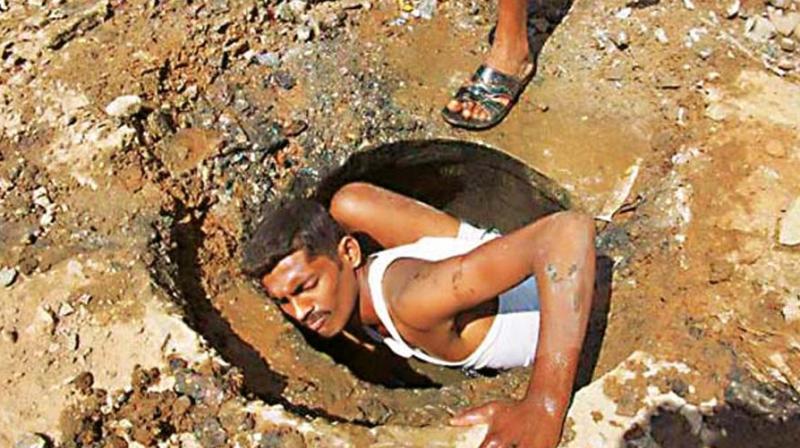When life and dignity go down the drain

65 lives lost in six years, in Karnataka alone - manual scavengers, who take on the unholy task of cleaning the city's drains, work in extremely dangerous and toxic conditions that have claimed many a life. In March 2014, the Supreme Court abolished the practice and directed states to rehabilitate those who had lost a family member to it. Despite the rise in the number of deaths, however, the BBMP, BWSSB and the Labour Department have done nothing to uphold the SC ban or procure equipment for a machine-driven process. Meanwhile, not a single conviction has been made in cases pertaining to manual-scavenging deaths.
With the city barely a week into the new year and the accompanying revelry, tragedy struck as three manual scavengers met a horrifying death in a manhole they had entered in response to an SoS from an apartment complex in HSR Layout on January 7. Shockingly, they died of suffocation while trying to clear the manhole of human excreta.
They are only the latest victims of the inhuman practice that has continued for centuries despite the many protests it has provoked. Far from being relegated to the pages of an ignorant past, it continues to thrive in the city, claiming more victims by the year. Take last March when three sanitary workers of the BWSSB died of asphyxiation on the Kaggadasapura Main Road, C V Raman Nagar while working in a drain to clear a block.
When BWSSB stands for the Bangalore Water Supply and Sewerage Board it is clear it is responsible. Who else should handle the sewage generated?
— narasimha murthy
activist for safai karmacharis
And the previous year, on April 4, 2016, four people (two workers and two passersby) died of asphyxiation in Doddaballapur, when they got stuck in a 15 ft. deep manhole.
Read| Guest Column| Why hasn’t there been a single conviction in manual scavenging cases?
The list goes on. In fact, over the last six years 65 manual scavengers have lost their lives across Karnataka, claims the BWSSB Contract Workers' Union. But this staggering figure may not tell the full story either as several cases of deaths due to manual scavenging go unnoticed, according to it.
The practice has been frowned upon by the Supreme Court, which ordered abolition of manual scavenging in March 2014 and directed all states to come to the rescue of the families of workers, who died as a result of it. There’s also the Prohibition of Employment of Manual Scavengers and their Rehabilitation Act, 2013 that makes the employment of manual scavengers a punishable offence
But despite the ban and the increasing deaths of manual scavengers, neither the BWSSB, BBMP nor the Department of Labour cares to take action to a put a stop to it. In the absence of strict monitoring, workers continue to enter manholes and sewers at great personal risk.
But ask Mr Tushar Girinath, chairman, BWSSB why it has done nothing to stop manual scavening and he retorts, "How can the BWSSB he held responsible for the deaths that took place in the grounds of a private apartment complex? We do not have adequate staff to look after even the city's sewer pipes and have outsourced employees to do the job. We cannot be expected to look after the STPs in private apartments as well."
In his view the Department of Labour and the BBMP, which register private companies and give them trade licenses, should take action in such cases.
But an activist, Narasimha Murthy, who fights for the welfare of safai karmacharis, finds his argument untenable. "When BWSSB stands for the Bangalore Water Supply and Sewerage Board it is clear it is responsible. Who else should handle the sewage generated in the city?" he asks indignantly.
Asserting that it is the fundamental duty of the state and BWSSB to take care of the city's sewage, he underlines, “The BWSSB cannot wash its hands off the matter, saying the incident took place in a private apartment. All departments need to work together to get rid of this practice and those responsible for it must be booked under Section 304 B of the Cr.Pc, which makes it a non-bailable offence to teach others a lesson."
Fault lies with BBMP, BWSSB, say activists
“Please order an immediate end to manual scavenging. How long will our poor die like this? This should not happen in Karnataka,” tweeted former director of Infosys and present chairman of Manipal Global Education Services, Mohandas Pai, referring to the recent death of three manual scavengers in the city.
He continued in his tweet, addressed to Chief Minister Siddaramaiah, KPCC working president, Dinesh Gundu Rao and Minister R V Deshpande, “ What should be done to avert such incidents from repeating in future? Even with the advent of machines, why are humans still deployed?
While the men he addressed, predictably, gave no response, Mr M R Venkatesh, chairman, Karnataka Commission for Safai Karmacharis lays the blame squarely at the door of the BBMP and BWSSB for the problem.
“We had recommended to the state government, BBMP and the BWSSB that the city should have a Manhole Cleaning Task Force, well trained and with all the necessary gear for cleaning sewers. We suggested there could be a helpline like the one for the police and ambulance for the task force, to help people contact it if their sewers were blocked. The task force could do the service professionally, get paid for the job and leave. But till date there has been no response to our suggestion,” he shrugs regretfully.

